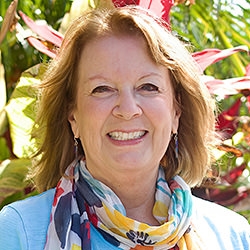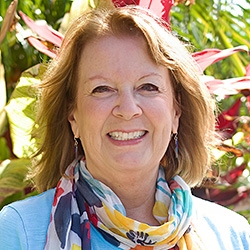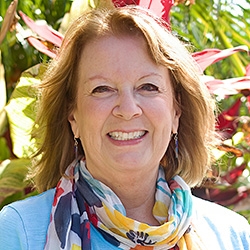
Search Results: society
-
Untethering from dominant culture and internalized oppression takes releasing attachments and persistence inspite upheavals -- all with insufficient support. Even in community building we can bring oppression into our efforts to untether. The more we walk towards vision, the more tethers of patriarchy we undo, the more the cost. By exacting such high cost, patriarchal societies reproduce and sustain themselves. To untether we need fortitude.
-
-
It is the first day of December and it seems to me as if 2023 went by with a flash. I have felt deep despair about the growing division between people and the devastating impact it has had on human beings, all life in fact, including our planet. And, I have also experienced many moments of joy and satisfaction this year.
-
Listen and learn how to:
- Talk about NVC in a way that has meaning and relevance for companies and organizations, showing a clear ROI (return on investment).
- Draw on different applications of NVC for the workplace: addressing change in management, management issues / styles, morale / teamwork, employee retention, etc.
- Create a value-based training proposal (with different service and product options) based on the needs of each specific client.
- Structure meetings with potential clients to move agreements forward.
- Custom design any materials, activities and languaging for each client.
- Develop your own marketing materials to increase your outreach and build your business of sharing NVC
-
Trainer tip: Be aware of times when you are judging others, demanding, making comparisons, or denying responsibility for your actions. Notice how these communication patterns affect your connection with other people.
-
Read on for a demonstration of self empathy -- all generated within the context of both the COVID-19 pandemic, and the changes to Bridget's life that have arisen as a result.
-
- Learn how to transform NVC into a tool for systemic awareness and healing
- Examine the influence of difference, and uncover pathways that strengthen its capacity
- Learn to receive and offer feedback on impact in situations fraught with power differences
- Explore specific ways in which NVC systemically supports the full flowering of humanity
- Delve into the dynamics of cultural differences, and discover how NVC can systemically contribute to a liberation perspective
-
A chosen, interdependent world… In most cases, that's sure not the world we live in today, is it. But it could be the world we live in tomorrow. And you can choose to be part of bringing that better world to life – to be part of a gradual, joyful transformation – simply by using the dynamic, living power of Dialogue.
-
Trainer Tip: Sometimes I wish others would make it easy for me to live my values. If other people would just do their part, I wouldn’t have to work so hard at doing mine. Can you relate? However, if I support peace in the world, this means I act peacefully because it’s important to me, not because it’s important to others. Identify your most important value today. Then live it. Notice how healing this can feel even just after one day.
-
“Nonviolence” is not just a political tactic. It is a “soul force,” a courageous and compassionate stand in the face of what seems to us unjustly unequal, oppressive, and violent. It is the force of love meeting and transforming what appears to not be love.. It is the force of love meeting and transforming what appears to not be love. It is speaking and listening with courage, compassion, and an open heart and mind and rooted in our truth in a way that bridges understanding. And doing so without demand nor trying to convince -- all in the face of any anger, fear, oppression, inequality, violence or disagreement.
-
How do we talk to ourselves and with others about polarizing topics in a way that's supportive? Seek to understand and be understood rather than press for agreement. Bring mindfulness into the conversation. Slow down and use structure to support everyone. Release knowing the solutions, answers or outcomes. Keep focus on shared universal needs. From this place we can say what's in our hearts and minds, and trust the process.
-
Trainer Tip: Punitive use of force stems from a belief that people behave in certain ways because they're bad, and that they need to be punished to mend their ways. One way to punish is to judge them. In contrast, protective use of force stems from a desire to prevent injury or injustice. It focuses on protecting people’s rights and well-being, not judging their behavior.
-
How excited do you get about connecting with people who are proving themselves right and who act like they know it all? Do you prefer the company of not-knowers who are in awe of the mystery of life and exploring with humility and innocent curiosity? Masking our vulnerability in not-knowing can point to deep wounds inside us, where perhaps the common denominator is our desire to prove our worth.
-
Even leaders we admire may exhibit behaviors that could be labeled as abusive, at least slightly. This includes not treating followers as equals, using charm, and hiding or twisting truth. In such scenarios a key reason for this is loneliness. If we're using our work and position primarily to gain for appreciation, acknowledgement, and acceptance then we need to examine our own loneliness. We need feedback to keep such conduct in check.
-
By guessing our child's feelings and needs we open the door to understanding what's behind their behavior, and can better suggest solutions that meet both their and our own needs. In this way we build trust and their desire to seek us out in times of need. Expressing our own feelings and needs also allows us to help them understand the value in fulfilling tasks or requests.
-
- Discover how mediation is a fundamental social skill that everyone can learn
- Gain the skills to stay centered when a conflict becomes heated
- Learn how to lead a dialogue toward sustainable agreements
- Help facilitate connection and creativity to discover and meet everyone’s needs
-
Hello friends. I’m Roxy Manning. When Mary invited me to write this letter, I could not help but reflect on what has been most alive for me recently… the way many of us will easily help someone else, but fear to ask for help for ourselves. On December 4, I had an operation. My doctor predicted my recovery would take three weeks. As I prepared for the time off, I rushed to complete all of my work and personal commitments. I prepped and froze dishes so I would have things to eat after and arranged meal deliveries. Very few people knew I was having an operation and I reached out to only one person for support after. In hindsight, I was doing everything I could so...
-
Every interaction with children contains messages about who they are, who we are, and what life is like. By engaging attachment parenting and NVC we give them rare gifts in society: to know their parents well, to discover the effects of their actions without being blamed for them, and to experience the power of contributing to meeting others' needs, and the power to move towards mutually satisfying outcomes.



















